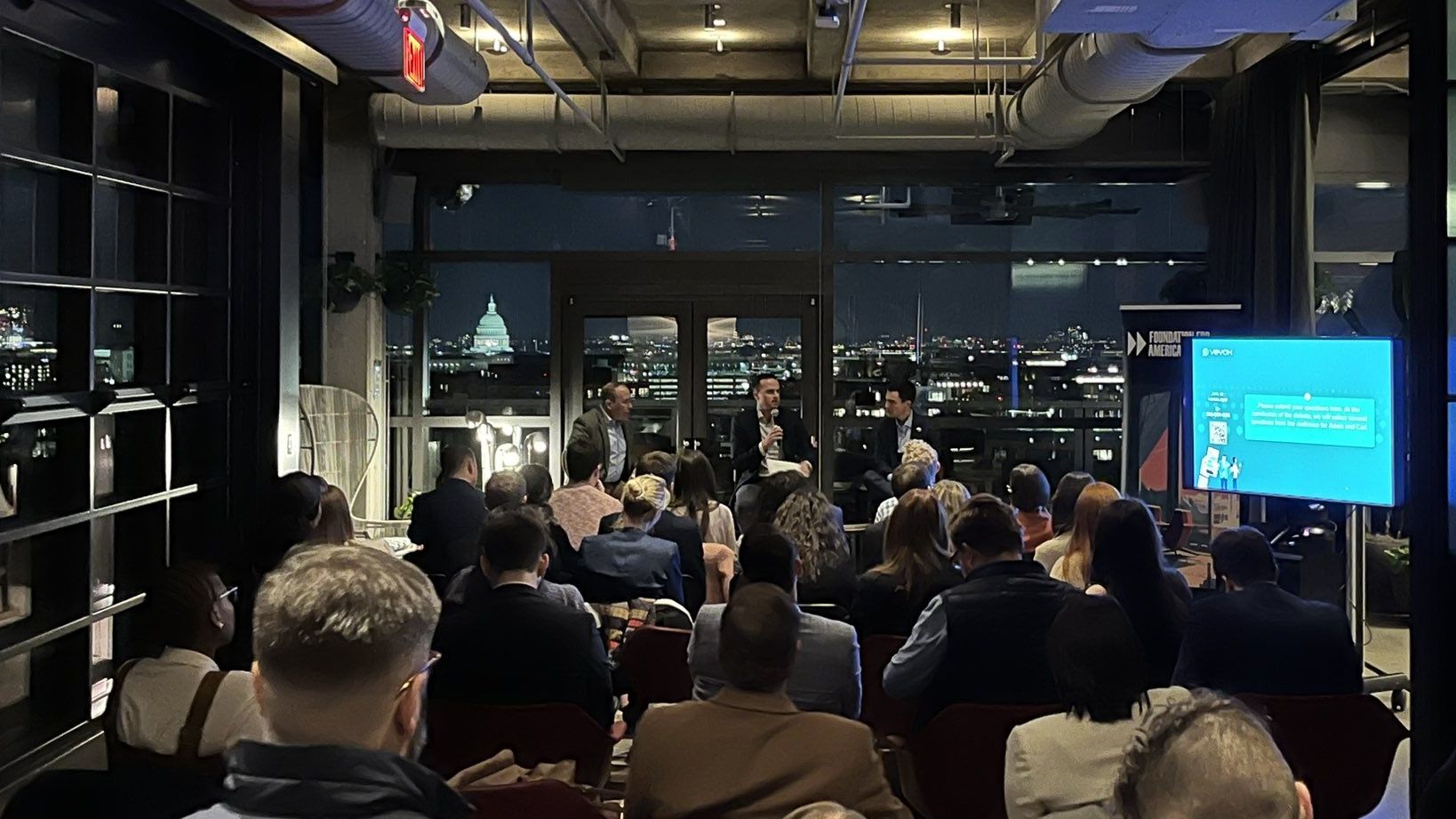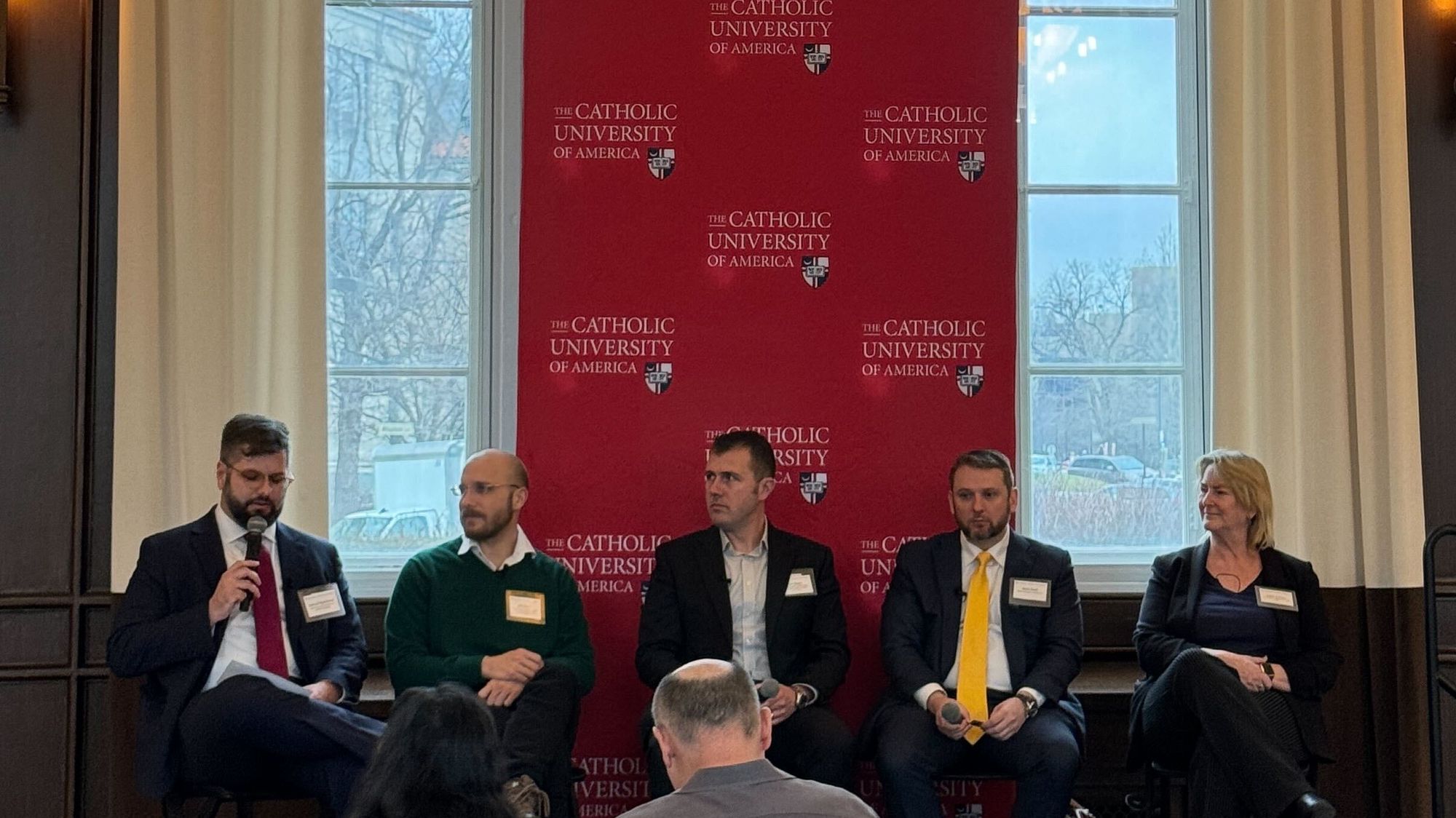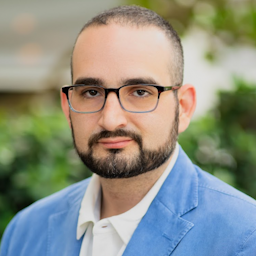Dear friend of FAI:
I’d like to share with you some of our recent activities, including new analysis from the Research team, project updates from Labs, and other developments across the Foundation for American Innovation.
We recently announced our 10-year anniversary gala and conference, Reboot24: The New Reality, taking place September 4–5 at Fort Mason, San Francisco. We’d love to see you there! You can also take a look at our sponsorship deck here.
We’re also partnering with Young Voices for a debate in Washington, DC on April 24 to consider whether TikTok should divest or face a ban. The debate will feature Michael Sobolik of the American Foreign Policy Council and Matt Stoller of the American Economic Liberties Project, facing off against Jennifer Huddleston of the Cato Institute and Mike Godwin of Godwin’s Law Consulting.
We’re excited to be building out our team. To help with our expanding slate of events, we recently welcomed our new Director of Events and Marketing, Rhonda Bonneville. We also welcomed Joshua Levine as Manager of Technology Policy to support our research on competition policy and emerging technologies. And we’re looking forward to bringing Thomas Hochman, our Research Associate, on full time in the coming months.
Research
Our policy team had a busy quarter, working to strengthen national security, improve American governance, and keep America at the forefront of technological dynamism.
Reports, Testimony, and Comments
For the New Atlantis’s winter issue, Research Manager Robert Bellafiore contributed an essay on the case for conservative futurism. Reviewing James Pethokoukis’s new book, The Conservative Futurist: How to Create the Sci-Fi World We Were Promised, he argues that while Pethokoukis’s accelerationist vision of technology offers a strong policy agenda, it is weakened by its disdain for the past and its desire to escape politics. Robert offers an alternative approach to conservative futurism that is more likely to get us to the future Pethokoukis imagines. We also brought Pethokoukis onto our podcast The Dynamistto continue the conversation in person with Robert and Senior Fellow Jon Askonas.
FAI is excited to continue its partnership with POPVOX Foundation to help educate and build new tools to help congressional staffers get up to speed on AI, and its application in congressional office workflows. The latest component in this series is a guide to AI prompts to help congressional staffers write one-pagers, social media posts, and more. The guide was highlighted in Politico’s Inside Congress newsletter. We’re looking forward to releasing further tools in the coming months.
Last year’s scrambles for the speakership of the House of Representatives, first in January and again in October, highlighted the importance of negotiations over the new rules and procedures that govern the House every two years. Recognizing the need for a greater public understanding of how the House operates, FAI has created RulesCompare, a website allowing users to study and compare changes in House rules over time. The site currently allows users to track changes in the text of rules from the 78th to 118th Congresses (from 1943 to the present), and older Congresses and other features will be added over time. Former Policy Technologist Lars Erik Schönander wrote about the tool for the Federalist Society blog.
Research Associate Thomas Hochman contributed an essay to the latest issue of Forum, published by the Oxford Institute for Energy Studies. Looking at the obstacles blocking nuclear power in America, Thomas argues that nuclear’s challenges go deeper than the political opposition of environmentalists and regulators. Nuclear advocates will therefore need to update how they talk about energy policy and show that nuclear has many benefits for America, even if it cannot compete with clean energy simply on price.
We submitted reply comments to the Federal Communications Commission regarding the reimposition of net neutrality rules, arguing that there is little national security justification for reimposing Title II classification for broadband services. National security experts have not weighed in on the ongoing debates over net neutrality, giving the lie to the claim that Title II and net neutrality are necessary for our national security.
Robert submitted a letter to the Senate Committee on Health, Education, Labor, and Pensions regarding efforts to improve children’s literacy, as well as the federal government’s role in education R&D. Robert argued that at the state level, there is much the government can do to ensure that effective, research-based methods for teaching literacy become the norm, and that the federal government can support this work by improving the value of federal education R&D.
We joined an amicus curiae led by the Electronic Frontier Foundation, arguing that interoperable software should not be considered "sequel" or "derivative work" under intellectual property law.
We recently announced two upcoming symposia. The first, Reforming Chevron, Restoring Congress: Legislative Responses to Changing Deference Doctrines, is a joint project of FAI and the Antonin Scalia Law School’s C. Boyden Gray Center for the Study of the Administrative State. For 40 years, Supreme Court precedent has held that courts should broadly defer to agencies in their interpretation of statutes. This doctrine, called Chevron deference, is under reconsideration this year. If Chevron deference is reformed or renounced, it could significantly reallocate constitutional power among the three branches. The symposium will publish new papers that address the challenges and opportunities Congress could face as the Supreme Court reconsiders Chevron. If you’re interested in participating, please contact Robert at robert@thefai.org.
For the second symposium, Shaping the Future of Social Media with Middleware, FAI is partnering with the Stanford Cyber Policy Center to convene leading thinkers at the nexus of social media, middleware, and public policy to delve into the complexities and potential of middleware as a transformative force. The outcome of the symposium will be a comprehensive white paper offering recommendations and a roadmap for developers, investors, and policymakers. For more information, please contact Director of Policy and Outreach Luke Hogg at luke@thefai.org, and take a look at Non-Resident Senior Fellow Richard Reisman’s past writings on middleware.
Commentary and Impact
Many policies that our scholars have advocated for saw progress this quarter.
Concerns about the cybersecurity risks posed by the CCP-affiliated app TikTok continue to grow, and with good reason, as we have shown in our writings and testimony. Two years ago, Head of Policy Dan Lips and I recommended that Congress force the divestiture of TikTok, so we were excited to see the recent passage in the House of a bill that would force TikTok’s owner ByteDance to sell the app if the company wants to remain in the U.S. market. I was quoted in the House Energy and Commerce Committee's press release in support of the bill, which is now being considered in the Senate.
Lars has warned about Chinese state-owned companies owning U.S. farmland and called for greater oversight of land acquisitions by foreign entities. A recent report from the Government Accountability Office reflects growing government attention to this issue. Finding that foreign investment in U.S. farmland rose to 40 million acres in 2021, GAO has recommended that the Department of Agriculture improve its methods for collecting, tracking, and sharing data on foreign investments. In response to the report, a bipartisan group of senators introduced a bill incorporating GAO’s recommendations.
Lars has also written about the dangers of the U.S. government’s use of Chinese drones, especially from the companies DJI and Autel. The Cybersecurity and Infrastructure Security Agency and the FBI recently released a guidance warning against the use of Chinese drones in critical infrastructure and offering recommendations to improve cybersecurity. In response to the guidance, Representatives Mike Gallagher and Elise Stefanik released a statement calling for banning “CCP-backed spy drones.”
For several years, Dan and I have recommended that Congress require GAO to estimate potential cost savings that could be achieved if the watchdog agency's nonpartisan recommendations were implemented. In 2022, Congress required GAO to issue two reports by enacting a law in the National Defense Authorization Act and through appropriations report language, which GAO issued last year. This February, GAO included the implementation of open recommendations in its annual report on the nation's fiscal challenges, explaining that implementing open recommendations would achieve tens of billions in cost savings.
Lars and FAI board member Michael Kratsios, former Chief Technology Officer of the United States and Under Secretary of Defense at the Pentagon, have warned about the cybersecurity risks posed by U.S. container ports’ reliance on Chinese cranes. A recent congressional probe into these cranes identified further reasons for concern, finding irregular communications equipment that could be remotely accessed. In a welcome development, the Biden administration recently announced that it will invest billions to boost the domestic manufacturing of cranes and reduce our reliance on Chinese cranes.
The first minibus appropriations package reflects several of FAI’s institutional priorities:
- Flat funding for the Bureau of Industry and Security, avoiding the chance of budget cuts. As Senior Economist Samuel Hammond has written, BIS plays an important role in “promoting continued U.S. strategic technology leadership.” Additionally, a new reporting requirement sets up BIS to make the case for further funding next year.
- Several provisions regarding the Agricultural Foreign Investment Disclosure Act (AFIDA), which, as Lars has argued, plays an important role in protecting U.S. farmland from purchases by dangerous foreign entities. The bill would make the Secretary of Agriculture a member of the Committee on Foreign Investment in the United States (CFIUS) with respect to transactions related to farmland, industry, and biotechnology, and would require the Secretary to inform CFIUS of farmland purchases reported under AFIDA that could pose national security risks.
The prohibition of using funds in contravention of the American Security Drone Act of 2023, in line with Lars’s recommendations to improve the federal government’s cybersecurity.
The second minibus appropriations package had several FAI successes as well, as Luke explained in a blog post:
- Funding increases for legislative support agencies such as GAO, an agency we have championed for providing significant taxpayer savings.
- A prohibition against the U.S. Capitol Police purchasing drones manufactured in China or by a business affiliated with China.
In a paper last year, Thomas argued that the Clean Air Act has become a massive regulatory barrier to the U.S. semiconductor industry, and showed how reforming our environmental policies would boost manufacturing. His research was recently cited by Representatives Brandon Williams and Andrew Garbarino in a letter to New York Governor Kathy Hochul and other members of the legislature, calling for reforms to support innovation in New York while still protecting the environment.
Our commentary included the following:
- Dan Lips, “Why Is the US Funding Research to Help China Win the AI Arms Race?” in Fox News
- Richard Reisman, “Protecting Freedom of Thought by Deciding What Information You Consume,” in Tech Policy Press
- Richard Reisman, “The Supreme Court Can Help Fix Social Media Governance With NetChoice Ruling,” in Tech Policy Press
- Roslyn Layton, “Safety Culture vs. Safety Systems in U.S. Transportation,” in the Regulatory Review
- Roslyn Layton, “Patent Trolls Are Harming Innovation. Congress Can Help,” in ProMarket
- Sam Hammond, “Europe Blunders on AI,” in City Journal
- Luke Hogg, “Blockchains Alone Won’t Reinvent the Web,” in City Journal
- Robert Bellafiore, “It’s the Elites, Stupid,” in the American Conservative
- Luke Hogg, “How John Deere Hijacked Copyright Law To Keep You From Tinkering With Your Tractor,” in Reason
- Robert Bellafiore, “American STEM Education Needs an Overhaul,” in the National Interest
- Robert Bellafiore, “Serfing the Internet,” in the Washington Free Beacon
- Robert Bellafiore and Dan Lips, “House Republicans Should Improve K-12 Education Research and Transparency,” in RealClearEducation
- Dan Lips and Robert Bellafiore, “Congress Can Improve School Finance Transparency,” in The Hill
- Thomas Hochman, “Bring the Clean Air Act into the 21st Century,” in The Hill
- Jimmy Soni, “The Ascent of SpaceX’s Starship Is a Testament to American Ingenuity and Perseverance,” in The Hill
- Roslyn Layton, “Adding to Regulatory Burdens Doesn’t Necessarily Improve Cybersecurity,” in C4ISRNET
- Luke Hogg, “The FCC is Behind the Times on Satellite Internet,” in Broadband Breakfast
- Roslyn Layton, “California Can’t Rush Consumer Privacy Regulations. Here’s Why,” in the San Diego Union Tribune
- Dan Lips, “Students Deserve Better Information about Billions Spent on Education R&D,” on the Thomas B. Fordham Institute blog
- Robert Bellafiore, “A Grand First Draft,” in The Dispatch
- Luke Hogg, “Protecting Taylor Swift from Deepfake Nudes Doesn't Require a New Civil Right”
- Dan Lips and Robert Bellafiore, “An Interview with Former NCES Commissioner Lynn Woodworth”
- Josh Levine, “TikTok Divestiture Bill Balances National Security and Competition”
- Dan Lips, “After All the Security Warnings, Why Is President Biden Still on TikTok?”
On his Substack, Second Best, Sam has been writing about Effective Accelerationism, the origins of human civilization, and the end of history.
Highlights among our media hits included the following:
- Sam was profiled in Politico’s Digital Future Daily newsletter, where he discussed overhyped technologies, underrated ideas, and more.
- Dan was profiled in Roll Callabout his efforts to strengthen Congress both when he was a Senate staffer and now through his work at FAI.
- Sam spoke to FedScoop about picking the bipartisan, low-hanging fruit available as Congress crafts comprehensive AI legislation.
- Jon joined The Spectator’s podcast to discuss Jon Stewart’s influence on television and politics—a topic he also discussed in an essay for the New Atlantisin 2022.
- I spoke to Digital Future Daily about the challenges that a positive tech agenda will face in the next presidential administration, no matter who is elected.
Labs
It’s been an exciting quarter for the Labs team. Our goal is to bring technology and creative partnerships to bear in solving high-stakes problems facing our country, and we’re pleased to report on the success that our products are seeing.
Schoolahoop
Schoolahoop, our platform for school choice, saw record growth last year, and in 2024 it’s clearer than ever that Schoolahoop is an essential tool to help parents send their children to the best schools available. The platform streamlines the process of identifying the right schools by helping parents find relevant schools and scholarships, connecting them to program administrators, and showing parents what options fit their needs.
In 2024, Schoolahoop’s user base is up 340 percent year over year, building on last year’s more than 2,000 percent user growth. Now, we’re working on several new features and expansions to reach even more users. A “Claim Your School” feature will allow administrators to claim and update their Schoolahoop profiles so that parents have the most up-to-date information. We also aim to add early reading programs and extracurricular programs, giving parents further information about available schools. And we’re hoping to expand Schoolahoop to several new states this year, including South Carolina, Arkansas, New Hampshire, and Mississippi. We’re confident that Schoolahoop can be a major player driving the adoption of new education savings accounts in several states across the country.
If you or anyone you know is interested in working with us, please don't hesitate to reach out to our Head of Product, Brandon Detweiler, at brandon@thefai.org, or our Chief Operating Officer, Grace Meyer, at grace@thefai.org.
BIPBounty
BIPBounty is the first platform for crowdsourcing tax-deductible bug bounties for Bitcoin Improvement Proposals (BIPs). We’ve received 1.31 BTC in bounty program donations, and late last year we gave the first reward for a contributor’s proposal for the BIP-119 bounty program. In 2024, our team is aiming to add additional BIPs and other Bitcoin R&D projects to support the open-source development of Bitcoin and its community.
If you’re interested in supporting BIPBounty, you can do so here. For any other inquiries or recommendations, or to highlight any BIPs to add, please contact brandon@thefai.org.
Project Nickel
Project Nickel is FAI’s platform for parents, journalists, and policymakers who want to see what public schools spend and where their money goes. Our goal is to increase transparency and awareness in K-12 education spending nationwide because we believe it should be easy for the public to know how much money is being spent by our public school system. In 2024, we’re working to consolidate Project Nickel’s K-12 school database and will be adding a return-on-investment feature, which will allow comparisons between schools and even types of schools (for example, charter vs. traditional public). We’re confident that these new features will further empower parents to make the best choices for their kids.
Events
This quarter, we hosted events with some of our favorite organizations and thinkers.
In February, we held a debate about online content moderation and the role of private companies in shaping public debate. Adam Candeub, professor of law at Michigan State University, debated Carl Szabo, vice president and general counsel at NetChoice, over the policy merits and legal challenges of two pending Supreme Court cases, Moody v. NetChoice and NetChoice v. Paxton.

Other highlights among the events our scholars spoke at included the following:
Jon organized a conference at Catholic University on “Generative AI and National Security.” Michael gave a keynote presentation, Sam moderated a panel on the military implications of generative AI, and Jon moderated a panel on AI governance's implications for national security.

Luke interviewed Byron Tau, author of the new book Means of Control: How the Hidden Alliance of Tech and Government Is Creating a New American Surveillance State, at an event with America’s Future.
Dan spoke at the Children's Scholarship Fund's partner summit in New York City, where he discussed the progress over the last 25 years in the national movement to give parents access to high-quality education options.
Jon gave a virtual lecture on Peter Thiel’s essay “The Straussian Moment.”
Looking ahead, we’re planning events in San Francisco on middleware and technological acceleration, as well as a defense innovation dinner in NYC.
Podcasts
On our podcast, The Dynamist, Media Fellow Evan Swarztrauber brought on some of today’s most important thinkers and doers to discuss the future of technology, governance, and innovation. Recent episodes have featured Beeper co-founder Eric Migicovsky, the Internet Archive’s Jamie Joyce, and Project Liberty founder Frank H. McCourt Jr.
Media Fellow Marshall Kosloff and Saagar Enjeti have continued hosting the podcast The Realignment, which is sponsored by FAI. They’ve had conversations in recent months with figures such as Noah Smith, author of the Noahpinion Substack; Lucas Vaz, Founder and General Partner of Ravelin Capital; and Jeffrey Rosen, President and CEO of the National Constitution Center.
Book Recommendations
The FAI team has been getting into some great books in recent months. Here are a few that members of the FAI team recommend:
- The Man from the Future: The Visionary Life of John von Neumann, by Ananyo Bhattacharya
- The Sleepwalkers: How Europe Went to War in 1914, by Christopher Clark
- The Reckless Mind: Intellectuals in Politics, by Mark Lilla
- A Connecticut Yankee in King Arthur's Court, by Mark Twain
- Ministers of Reform: The Progressives' Achievement in American Civilization, 1889-1920, by Robert M. Crunden
- Technology and Empire, by George Grant
- Our Biggest Fight: Reclaiming Liberty, Humanity, and Dignity in the Digital Age, by Frank H. McCourt Jr.
- Dune, by Frank Herbert
- Man, the State, and War: A Theoretical Analysis, by Kenneth N. Waltz
- Capitalism without Capital: The Rise of the Intangible Economy, by Jonathan Haskel and Stian Westlake
- The History of Tom Jones, a Foundling, by Henry Fielding
- Read Write Own: Building the Next Era of the Internet, by Chris Dixon
You can also see a longer list of our recommendations on our Bookshop page.
Coming Soon
We have many projects in the works and are excited about the next few months. We’ll be publishing reports on the challenges of tracking recent infrastructure spending, the principles behind network neutrality for telecommunications, how drones can improve border security, and more. And stay tuned for more information about Reboot24 as we announce speakers and sessions!
Thank you for following our work. We appreciate your continued interest in FAI and welcome any questions or feedback.
If you’re interested in supporting our mission, you can donate here.
Sincerely,
Zach Graves
Executive Director
Foundation for American Innovation

